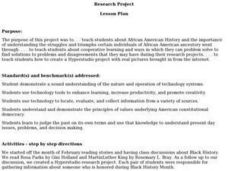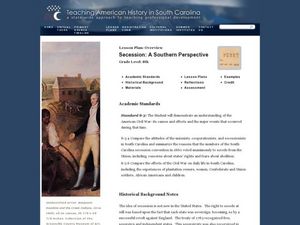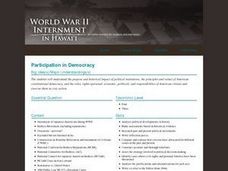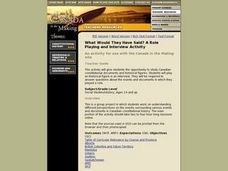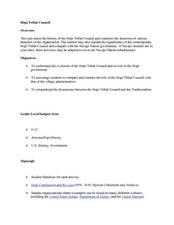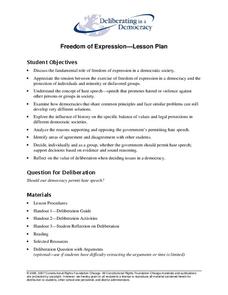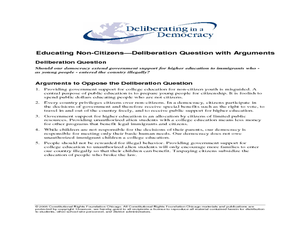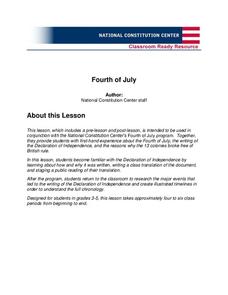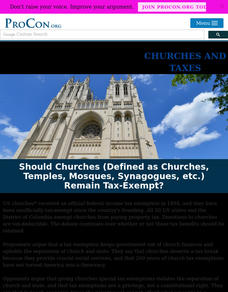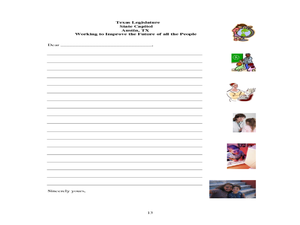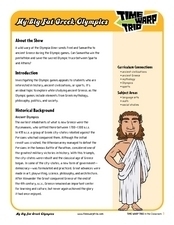Curated OER
Research Project
Students fill out a form which asked the WHO, WHAT, WHEN, WHERE, and WHY about the person they were assigned to research, they gather their information from different web sites on Lightspan and Yahooligans. They create a HyperStudio and...
Curated OER
Robert Boyle and the Mechanical Philosophy
Students read and discuss Boyle's Mechanical Philosophy and his rejection of Aristotle's theory of "Forms and Qualities." They answer a given set of questions and discuss these with the class.
Curated OER
Secession: A Southern Perspective
Eighth graders determine how secession impacted South Carolina as well as the United States. In this American Civil War instructional activity, 8th graders examine selected primary and secondary sources in order to study the state's...
Curated OER
Where Do We Go From Here?
Eighth graders examine the impact of Reconstruction on South Carolina. In this Reconstruction lesson plan, 8th graders use primary documents to research sharecropping and freedman's contracts in the agricultural South following the end...
Curated OER
Participating in Democracy
Students analyze film clips in class. In this democracy lesson plan, students identify the differences between civil liberties, democracy and freedom. Students view a video regarding Japanese internment and answer study questions as well...
Curated OER
Women's Suffrage: Examining Both Sides of the Issue
Eighth graders reflect on the main ideas behind Women's Suffrage. In this history lesson, 8th graders discuss the pros and cons in relation to Women's Suffrage and the 19th Amendment, then divide into small groups to complete several...
Curated OER
Bill of Rights
In this history worksheet, students demonstrate what they know about the U.S. Bill of Rights. Students use the letters BILL OF RIGHTS to start each sentence or phrase about the Bill of Rights.
Curated OER
What Would They Have Said? A Role Playing and Interview Activity
Students study Canadian constitutional documents and historical figures. They play an historical figure in an interview. Students answer questions about the events and documents in which they played a role.
Curated OER
A Constitution for Alaska
Middle schoolers read sections cited from the Governing Alaska unit. They discuss factors that made Alaskans push for statehood. They view video A Constitution for Alaska.
Curated OER
What is Meant by Returning to Fundamental Principles?
Students apply the principles and ideas suggested by the Constitution to a contemporary issue or problem, and work through the issue to reach their own conclusions.
Curated OER
Hopi Tribal Council
Focusing on the differences between traditional Hopi government and the Hopi Tribal Council, this resource is a good addition to your unit on Native American culture. Learners conduct Internet research, analyze primary source photos, and...
University of Arkansas
Our Responsibilities
The fourth in a five-lesson plan unit examining human rights and personal responsibility asks class groups to investigate a current rights issue, and using the provided graphic organizer, summarize the issue, consider which rights are...
National Constitution Center
Abraham Lincoln's Crossroads
History enthusiasts participate in an interactive website that brings Abraham Lincoln to life as he shares his personal experiences between 1854-1864. Scholars listen and read carefully to form their own opinions and discover if they...
Curated OER
Bill of Rights
US history classes explore constitutional rights as they relate to court cases involving teens. Your class must already be familiar with the Bill of Rights before beginning this series of exercises. In preparation for a debate-style...
Alabama Department of Archives and History
Alabama's Steps to Statehood
To demonstrate their understanding of the steps Alabama took to become a state, groups create a poster that identifies what the United States Constitution and the Northwest Ordinance required of a territory to become a state.
Deliberating in a Democracy
Freedom of Expression
Should democracies include hate speech as a protected right? Scholars analyze the rights found under the First Amendment to the Constitution through researching evidence. Freedom of expression becomes the focal point of the...
Curated OER
The Virginia Plan and the New Jersey Plan: Student Worksheet
These guided reading questions accompany several websites on the development of the US Constitution. While some of the links have changed, they are still accessible. History or government classes benefit from reading primary source...
Deliberating in a Democracy
Educating Non-Citizens
High schoolers distinguish between the privileges of being a U.S. Citizen and privileges that are forfeited if not a U.S. Citizen. For this history lesson, students analyze the rights of people in a democratic society through research,...
Minnesota Courts
Inside Straight: the Third Branch
Learners use the worksheet as they view the film Inside Straight: the Third Branch. Multiple case studies and the history of the judicial branch of the US government are included via hyperlink and act as the topics of discussion...
National Constitution Center
Fourth of July (Grades 3-5)
Bring history to life for your young scholars with a Fourth of July lesson series. After a class reading of the Declaration of Independence, students translate this pivotal document into layman's terms before working in small groups to...
Curated OER
Churches and Taxes
Churches have been tax-exempt since the founding of America, but should they be? Pupils ponder the question as they browse the website in preparation for a class debate or discussion. They research the history of tax-exemption for...
Curated OER
Women in Texas Politics: Winning the Vote, Three Pioneers, and Serving the People
Fourth graders study women's involvement in Texas politics. In this US history lesson, 4th graders discuss woman suffrage, examine three Texas female pioneer legislators by reading biographies, and explore women's issues by generating a...
Time Warp Trio
My Big Fat Greek Olympics
The Olympic Games are indeed a significant and far-reaching cultural component in our international community today, but from where do they originate? Where do our traditions stem from, and how do we choose the sports that constitute...
ProCon
Gay Marriage
The first legal gay marriage in the United States occurred in Massachusetts in 2004. Since then, countless others have tied the knot. Scholars decide whether gay marriage should be legal by reading a history of the issue, analyzing the...
Other popular searches
- Constitution History Outline
- The Constitution History
- Canada Constitution History
- Us History Constitution
- U.s. History Constitution


